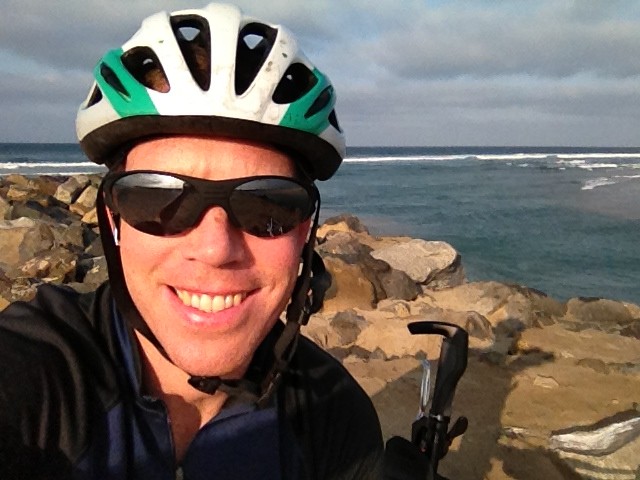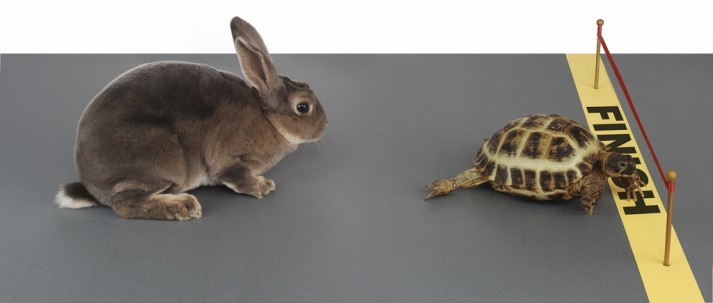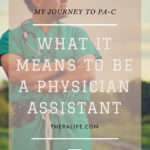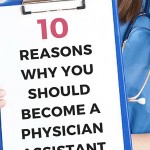"Success is the ability to go from one failure to another with no loss of enthusiasm." - Sir Winston Churchill
I've come to realize that it's not the best genetics, the highest GPA, or the most relevant healthcare experience that produces the most success, especially when it comes to being a PA or trying to become one.
It comes down to one word:
Grit
What the Hell is "Grit"?
No, not grits like in My Cousin Vinny.
Grit is defined as: "perseverance and passion for long-term goals."
There we go.
More and more research is coming out that shows in school, work, and in life, intelligence is no longer the most significant predictor of success. It's grit and character – the ability to push through adversity, challenges, and setbacks to find a new solution or path to success.
Angela Duckworth, a Psychology Professor at the University of Pennsylvania, has found through her research that:
"Smarter students actually had less grit than their peers who scored lower on an intelligence test. This finding suggests that among the study participants — all students at an Ivy League school — people who are not as bright as their peers' compensate by working harder and with more determination.' And their effort pays off: The grittiest students — not the smartest ones — had the highest GPAs."
She also discovered that:
"At the elite United States Military Academy, West Point, a cadet's grit score was the best predictor of success in the rigorous summer training program known as "Beast Barracks." Grit mattered more than intelligence, leadership ability, or physical fitness.
At the Scripps National Spelling Bee, the grittiest contestants were the most likely to advance to the finals — at least in part because they studied longer, not because they were smarter or were better spellers."
These findings suggest that the achievement of difficult goals entails not only talent but also the sustained and focused application of talent over time.
Last week in the New York Times, Thomas Friedman published an article that I couldn't agree with more: "Need a job? Invent one!" In this article, he references Harvard Education Specialist Tony Wagner, "Today, because knowledge is available on every Internet-connected device, what you know matters far less than what you can do with what you know."
So what does all this science and job talk have to do with a physician assistant life, getting into PA school, or becoming a physician assistant by design? After all, it's simple, right? Get good grades, make sure you have the prerequisite healthcare experience, and work hard, right?
As we all know too well, there is so much more to having the long-term success that goes beyond getting good marks and finding healthcare experience that looks good on an application. It's not how much information we know, but what we DO with that information that will determine our success.
Or, in wanna be PA terms, success is going from a blog reader to an action taker.
Instead of knowing all of the answers, instead of chasing the perfect healthcare job to pass the time, or waiting to write that perfect essay, people who succeed get started. And then they stick with it.
My Tale of Grit
I am proud to say that I am on a better road to being proud, confident, and strong.
But it wasn't always that way . . .
- I was cut from my high school basketball team for my size and lack of an outside shot.
- My grandmother told me as I left for college in Seattle that I was "selfish and not thinking of the family."
- I was told by my college guidance counselor that I would never have the grades to make it as a medical professional.
- I have struggled from time to time with depression and low self-esteem.
It wasn't until I adjusted my goals, changed my major, and started to believe in myself that I finally started to have success. From that point on, it was another six years of incremental improvements, setbacks, adjustments, and research that led to small changes and new tactics. I imagine I'll spend the rest of my life learning more, failing more, and trying to discover new ways to improve myself.
To some, this might sound boring or daunting.
However, I discovered that it is fascinating and encouraging to see improvement from week to week, no matter how small they are, to make a difference in peoples lives, to adjust my focus from one of self to "what can I do today to make somebody else's life better."
"Boring" became exciting, instead of blaming the world for what I didn't have, I became thankful for all the beautiful blessings I did have.
I fell in love with small changes and small wins, adding up to significant transformations.
Instead of saying, "ugh, I have to study, or ugh I have to work out (another passion of mine)," it's become "I wonder what I'm capable of today?
Somewhere early in the second half of my journey to a PA life, I decided I wanted to help others feel that same excitement without having to make all of the same rookie mistakes I made during my six years of discovery; I wanted to help beginners see progress and build momentum and confidence from day one.
This project is part of this mission.
I've learned that grit CAN be developed, and once you have it in one area of your life, it carries over to others.
Developing "True Grit"
When I moved past my initial goal of becoming an MD I didn't realize it at the time, what I was doing was identifying the new "normal" and the new "identity" I wanted for myself.
Then I proved that this new identity was actually a future possibility with teeny tiny small wins, building momentum, developing more grit, and perseverance.
Here's how you can develop grit yourself:
1) Identify the new "identity" you want to have. The more specific you can be with it, the easier it'll be to prove it to yourself. "I'm the type of person that never misses a lecture." "I'm somebody who hardly ever misses a workout." "I'm somebody who works on gaining healthcare experience and meeting my prerequisites every day." Remind yourself of this EVERY day by hanging up a post-it note on your bathroom window, or using your phone/calendar to keep this at the front of your mind.
2) Prove to yourself you can do it with small wins. Create a teeny tiny benchmark for yourself to show that you are heading in the right direction. Make it something you can do every day that takes less than 15 minutes. Five minutes is even better. Build a habit.
3) Build momentum by completing the small win every day for at least 30 days. Remember, we have limited willpower, so dump all of it into building this one habit.
4) Once you have established your new "normal," it's time to stretch again. Constantly adjust your new normal, but make the adjustment small so it's not a drastic adjustment. Slow and steady for the win!
5) If you fail at something, make sure you fail differently next time. Failing is not a reflection of your character. You're simply crossing something off your list that didn't work. Move onward and upward.
Physician Assistant Grits
Rule #1: It doesn't matter where you came from, only where you're going.
This is why I love meeting people and receiving emails from prospective PAs or practicing PAs. These are people like you and me: ordinary folks with normal lives and typical problems. They may not have healthcare experience, and they may be deciding between various healthcare careers. They may not understand what a PA does. Or maybe they are a PA student or a practicing PA who worked hard but didn't pass their PANCE or PANRE. Perhaps they have tried every tactic out there and struggled to find success for a long time. Then, for whatever reason, that light bulb went off in their head, and they were encouraged to try something different:
- Joe failed his PANCE: He reached out to those who had been successful, purchased a new review book, focused on completing PANCE practice questions every day, and then took a lot of practice tests. He is now working full time as an Orthopedic Physician Assistant.
- Staci didn't get into PA school on her first three tries: Now she is a 2nd year PA student who is looking forward to graduating head of her class and starting a career in family practice medicine.
- Ryan didn't know how he was going to pay for PA school. He applied for the National Health Service Corps and was accepted after his second try. Now he gets a monthly stipend and will fulfill his dream of working with an underserved population.
These guys didn't set out to drastically change their life, but they knew it was a possibility. They just focused on small wins, building momentum, and building a new normal for themselves. As a result of that, these men and women are forever changed.
My goal with The PA Life is to help you build grit and momentum. I've seen it happen with hundreds of people, and it all starts with one thing: the first step.
This is a challenging journey, but one I hope you're willing to take. There's no doubt in my mind you have it in you to become the passionate and caring healthcare provider you see in yourself, and I look forward to the day when you start to believe it too. Prove it to yourself.
Don't ever let anybody tell you that you can't accomplish something.
My dad always said this, and it is true: "excuses are like armpits, everyone has them, and they all stink. "
Tell me one small victory you've had recently and one small change you're going to make, or drop me a line and tell me what you need help with.
- Stephen Pasquini PA-C




















“…and I look forward to the day when you start to believe it too. Prove it to yourself.
Don’t ever let anybody tell you that you can’t accomplish something.”
WOW, that ending hit me! I didn’t realize how much I needed to hear that. Sometimes we need those types of reminders and I’m so glad I read this article. A bit bummed out that I got a C on my very first chemistry class in college, but you know what? After it’s all said and done, I still consider it one of those small victories. The especially big thing that I’ve done is make the switch from an Associates of Arts to Associates of Science. Something I NEVER felt I was capable of doing and didn’t bother entertaining the thought. But here I am now at 23, a bit over halfway through with my classes (mainly the science and math ones left). Chemistry seemed so intimidating, but I was lucky to have an awesome professor turn a scary mountain into a teeny anthill. That’s not to say that it’s an easy peasy course (it’s a whole subject all on it’s own!), but I’ve gained some confidence in the fact that yes, I AM capable of much more than I give myself credit for. And I think it’s safe to say that I’m no longer letting that C demotivate me from doing even better in chemistry 2 and in many others!! There are still a myriad of areas that I know that I can improve on and I’m going to keep moving forward–even if I have to go to the point of crawling instead of running. At least I’m still moving.
And not only that, but there’s still so much more stops left in my metaphorical road map before I even get to the stage of applying for PA schools. After I complete my associates, I want to complete a certification at my local college so that I can gain some healthcare experience via a job. (It takes like 9 months to complete. Yes, I am that eager to get into healthcare. Which is why you won’t see me going the MD route because I don’t have that kind of patience, LOL. Big respect to the MD’s though!)
Ramble aside, as yet another wannabe PA student, thank you for this article!
Also another thing I forgot to include: Before I even made the switch, I took a Anatomy and Physiology class so see how I liked it. Evidently, I got a B and those classes are NOT easy either. But I loved it! There was never a boring moment. One thing I learned the hard way though: NEVER TAKE LAB SCIENCES DURING THE SUMMER–especially more than one. So much info in so little time. I nearly metaphorically died trying to pull that off taking biology along with another science. YIKES. I’m actually taking part 2 of Anatomy and Physiology this coming Fall and I’m so excited! You better believe I’ll be reading ahead before the start of the semester. 😉
Interesting, I am hoping to get int PA school, but not feeling super hopeful because of my subpar undergraduate academic record, and my age. I did graduate school to try and show that I do have what it takes.
What I like about this, is the Finns have a word “sisu” that means “true grit” or “giving a little more when you think you have nothing left.”
I guess this explains why the Finns have the heaviest coffee consumption in the world (along with the best education system)! 🙂 My son and I were on a run the other day and we made our way up into this small grotto that has pieces of paper with notes written on them that people leave. My son (who is 9) was complaining about our jog and saying he was tired. He grabbed a piece of paper and is said: “Don’t stop when you’re tired; stop when you’re done.” Couldn’t have been better timing! One of the hardest things to do in life is to differentiate between fatigue and misdirection. If we are running down the road waiting to be done but we are running down the wrong road we can essentially run forever and not find what we are looking for. But if we are on the right road, and we keep running through the fatigue, disappointment, setbacks, etc. etc. we will eventually get there. And you don’t want to stop early. So you will have to decide if you are on the right road. You will know if you have had a chance to spend a lot of time working with PAs and within the field of medicine. Does it allign with your passion and your purpose? If so, then go for it, and dig deep into your “sisu!”
Stephen
A small victory for me. My dad passed away in March after my first observation in an OR. I am still a bit depressed but trying to get motivated again. I’m now sitting at the coffee shop at Kaiser waiting to meet the PA I’m going to be shadowing today. It’s a small step in the right direction I think. Thanks for the good news on “grit.”
Hi Vela, thanks so much for sharing your story. It’s hard to pick yourself back up after the death of a loved one, especially a parent. I am so proud of you for still digging deep and moving forward… and hanging in there. If this is no the definition of grit than I don’t know what is. Keep up the great work and let us know how the shadowing goes.
Stephen
Hi Stephen,
I recently got accepted into PA school and will be starting this upcoming fall. I am very excited but also anxious. Any tips for me as I enter into my first year?
Thank you for the great article. I have always been one that has to study very hard to do well.
Congratulations Lauren! This is a good question. Probably one of the best pieces of advice I can give you is to try to make it a goal to read about the topic being discussed in lecture prior to the actual lecture. My best friend in PA school was the master at this and I didn’t really appreciate the true power of this tactic until after we had completed the didactic year. When you have done some research on a topic before it is being discussed you come prepared with the right questions so as it is being discussed in class you will have a much better understanding of the materials. My friend graduated top of our class and he always seemed calm, prepared and relaxed. I know his strategy for preparation had a lot to do with this. Also, if you haven’t had a lot of anatomy I would suggest taking an online anatomy course or a CC course if it’s available. There are probably a lot of free options online these days if you do some research. You can start memorizing all those body parts now which will give you a huge leg up! I absolutely love OSMOSIS (www.osmosis.org) something that was not available to me while I was in PA school. But I use it a lot now in my board review course and they cover so many topics in a fun and interesting way. I would purchase a subscription and start watching these videos. They have tons of lectures and quizes on anatomy, biochemistry, microbiology, pharmacolgy and even some great tidbits on test taking skills and how to used spaced repetition. This woudl be a great place to spend some of your pre-PA school time. Also I love the essential anatomy 5 app to augment any anatomy course you may be taking. And search the iTunes or Google Play store for podcasts. This is a wonderful way to learn medicine topis while on the go.
Hope that helps some. Also, make sure to take a vacation! 🙂 What ideas have you come up with for preparation?
Stephen
Hi Stephen!
Thank you for this. This embodies my time as a struggling pre-PA student!
One small win recently has been that I started packing a lunch for full days of classes. It’s small, but I am absolutely proud because I used to spend money every day on Starbucks coffee and breakfast sandwiches, which aren’t too nutritious anyway. Or I would just snack all day. I feel awesome and well-nourished lately, and I’ve been saving some cash. Woo-hoo brain food!
Hello, my name is Richard Crum and i am a sophomore at Western Washington University, i am considering a PA career and am not sure if i want to pursue it but after examining other medical professions such as nursing and PT i have figured out that there is no other Profession i can see myself in in the current medical field. My father is a Pediatrician so i grew up surrounded by his work and his fulfillment through that and that helped me decide what to go to school for. I would love to hear back on any advice for what i can expect in the following years and if i should continue pursuing this career. thank you for writing this article as well!
our post, Developing Brand Awareness through Outlook and NetSuite, we needed a way to synchronize our Outlook Contacts to NetSuite using Outlook Categories while